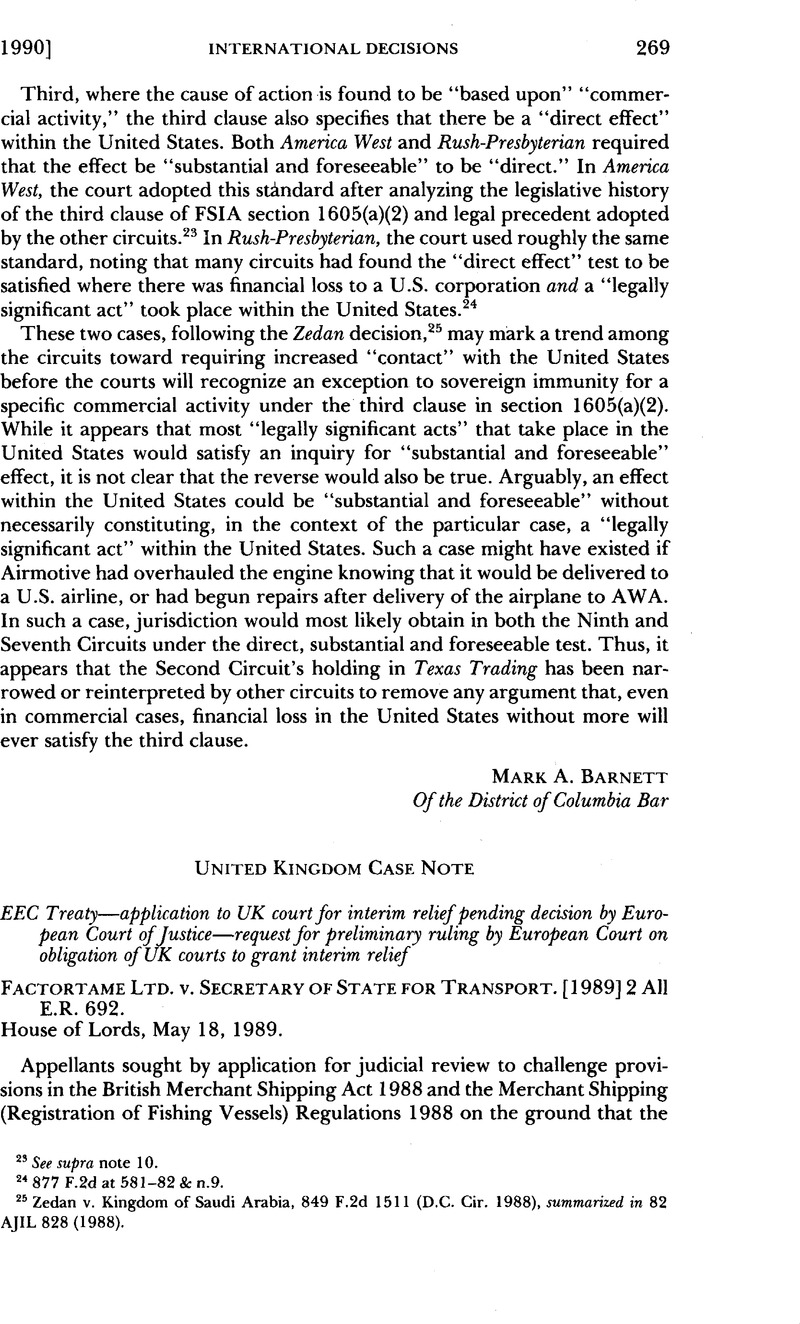No CrossRef data available.
Published online by Cambridge University Press: 27 February 2017

1 Treaty Establishing the European Economic Community, Mar. 25, 1957, 1973 Gr. Brit. TS No. 1, pt. II (Cmd. 5179 II), 298 UNTS 11 [hereinafter EEC Treaty].
2 Neither side appealed from the reference to the ECJ of the consistency of this UK legislation with overriding EEC law.
3 Polydor Ltd. v. Harlequin Record Shops Ltd., [1980] 2 Common Mkt. L.R. 413, 426 (C.A.).
4 Lord Bridge devoted considerable attention to the case of Hoffmann-La Roche v. Secretary of State for Trade & Industry, 1975 App. Cas. 295. Although the House of Lords in Hoffmann-La Roche had determined that the lower court had properly granted an injunction enforcing a statutory order before a challenge to the validity of the order was decided, the opinions of several Law Lords had stressed that courts need not in all circumstances grant interim enforcement orders while the validity of the underlying legislation is in dispute. Lord Bridge accepted this proposition but found it inapplicable to the situation in Factortame.
5 Section 31 of the Superior Court Act of 1981 had been construed in a prior Court of Appeal case to permit injunctions against the Crown in proceedings on an application for judicial review. Reg. v. Licensing Authority Established under Medicines Act 1968, Ex parte Smith Kline & French Laboratories Ltd. (No. 2), [1989] 2 W.L.R. 378, [1989] 2 All E.R. 113.
6 See Bridge, Procedural Aspects of the Enforcement of European Community Law through the Legal Systems of the Member States, 9 Eur. L. Rev. 28 (1984) (“While the Community constitutes a new and independent legal order, it is also in a sense a dependent legal order in that it relies for its enforcement on the legal orders of the Member States”).
7 Rewe-Zentralfinanz e.G. v. Landwirtschaftskammer für das Saarland, Case 33/76, 1976 ECR 1989; Comet B.V. v. Produktschap voor Siergewassen, Case 45/76, 1976 ECR 2043. See also North, Enforcing Community Rights in the English Courts, 50 Mod. L. Rev. 881 (1987).
8 B. V. Granaria v. Hoofdproduktschap voor Akkerbouwprodukten, Case 101/78, 1979 ECR 623.
9 Foto-Frost (Firma) v. Hauptzollamt Lübeck-Ost, Case 314/85, [1988] 3 Common Mkt. L.R. 57.
10 E.C. Commission v. United Kingdom, Case 246/89, slip op. (ECJ Oct. 10, 1989).
11 Id., para. 39.
12 Fin. Times (London), Oct. 12, 1989, at 40, col. 1.
13 The judges in the lower courts also reaffirmed this principle. Neill, L.J., stated in the divisional ruling that “the High Court now has a duty to take account of and give effect to EEC law and where there is a conflict to prefer the Community to national law.” [1989] 2 Common Mkt. L.R. 353, 373.
In the Court of Appeal, Bingham, L.J., explained that if the answer given by the ECJ on the first preliminary ruling is favorable to the appellants, the divisional court will be obliged to uphold the Community rights “even though the 1988 Act had not been repealed and even though its decision involves dispensing with (or disapplying) express provisions of the statute.” Id. at 396.
Lord Donaldson, M.R., expressed annoyance at the difficult position he often found himself in and said that “it would render a service to the nation if Parliament moved slightly more in the direction of Community law.” Id.
14 1986 Q.B. 716, [1985] 3 All E.R. 585 (denying French turkey producers the right to claim damages for losses allegedly suffered as a result of the Minister of Agriculture’s refusal to grant an import licence in time to permit shipment of turkeys to the United Kingdom for the Christmas market). According to press reports, the Government ultimately settled the case for approximately £3 million. There was a strong dissent by Lord Justice Oliver, who argued that Article 30 accorded each person the individual right to carry on the business of importing goods free from quantitative restrictions. Furthermore, Lord Justice Oliver concluded that since Community law requires that individual Community rights be protected to the same extent as domestic rights of a similar nature, infringement of Article 30 should enable individuals to claim damages.
15 See Cripps, European “Rights”, Invalid Actions and Denial of Damages, 1986 Cambridge L.J. 165. See also Garden Cottage Foods Ltd. v. Milk Marketing Board, [1983] 2 All E.R. 770, 1984 App. Cas. 130, rev’d on other grounds, [1983] 2 All E.R. 770.